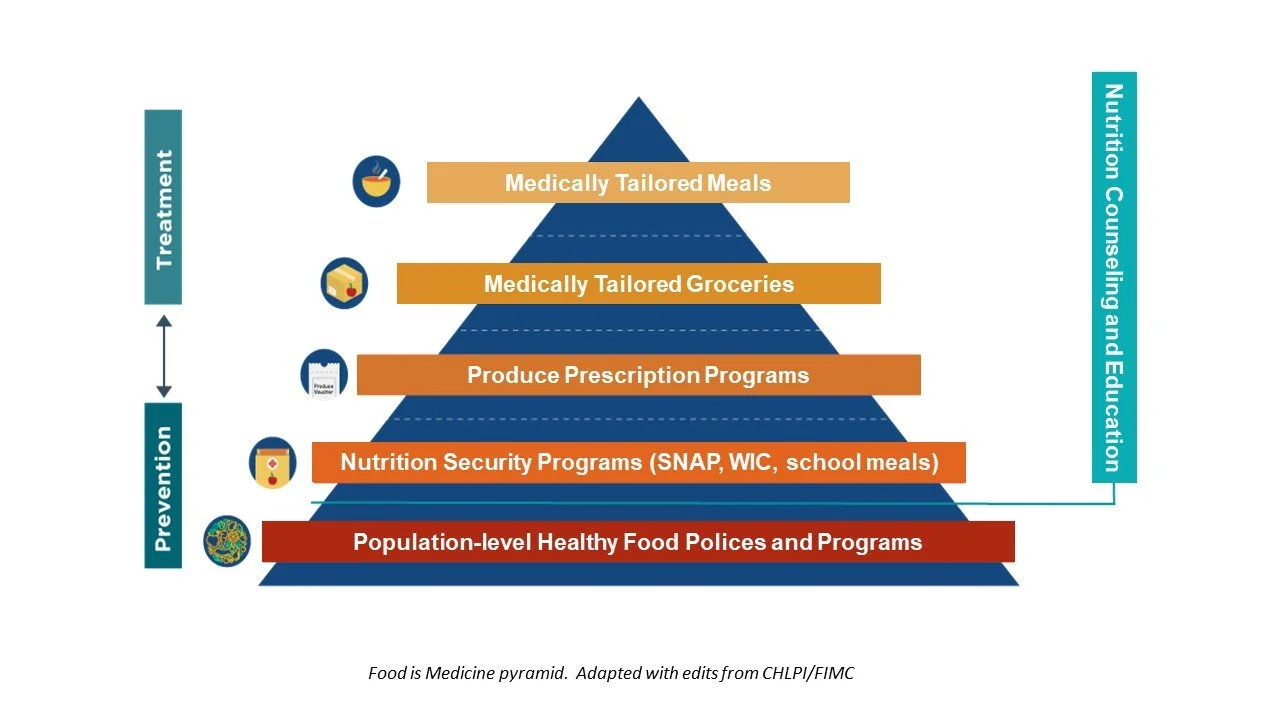On November 16, 2023, the Biden-Harris Administration announced their Action to Improve Health and Wellbeing by Addressing Social Determinants of Health. As part of this initiative, CMS released an Informational Bulletin, including an attached table, that describes the coverage pathways for services and supports to address health-related social needs (HRSN) in Medicaid and CHIP.
The Food is Medicine Coalition, a nationwide coalition of providers serving individuals with severe, complex, or chronic illness, strongly supports this guidance clarifying how nutrition interventions can be deployed in Medicaid 1115 waivers and beyond.
The guidance resolves several key policies challenges impacting nutrition provision, most notably:
Clarification of the 6-month Service Limit for Nutrition Interventions (1115 Demonstrations): This update expands on previous CMS guidance that limited nutrition interventions covered under 1115 demonstrations to a six-month duration. Now, all nutrition interventions that involve the direct provision of food – “home delivered meals or pantry stocking,” “nutrition prescriptions,” and “grocery provisions” – can be provided for up to six months and “may be renewed for additional 6-month periods if the state determines the beneficiary still meets the clinical and needs-based criteria.” This update follows best clinical practice standards, mirrors the research to date, and enables care teams to employ their clinical judgement regarding the most effective nutrition intervention for their patients.
Other key updates are:
Household Level Nutrition Services (1115 Demonstrations): Previously, nutrition interventions were limited to the primary enrollee. Now, CMS notes for “home delivered meals or pantry stocking” and for “nutrition prescriptions” that “additional [ ] support may be permitted under 1115 demonstrations when provided to the household of a child identified as high risk or a pregnant individual…for up the duration of a pregnancy plus two months postpartum.” This supports the household-level nutrition interventions approved and provided in Massachusetts’ most recent 1115 HRSN demonstration, showcasing a holistic, patient-driven approach to ensure the nutrition needs of the household can be met.
Home and Community-based Services (HCBS) Authorities for Nutrition Services: CMS confirms that “pantry stocking,” “nutrition prescriptions,” and “grocery provisions” are allowable services under HCBS authorities, which highlights that interventions beyond prepared meals are allowable.
These sound policy updates will improve the health of medically vulnerable Americans across the nation by providing medically tailored nutrition in a clinically appropriate manner. More importantly, by expanding access, we expect that this guidance will work to reduce health disparities and bring down healthcare costs as the wellbeing of recipients improves in the years to come.
We look forward to working with CMS and the Biden Administration to implement the proposed guidance and further invest in programs that ensure people have access to the medically tailored nutrition they need.
For a more comprehensive summary of the updated guidance, please visit the Center for Health Law and Policy Innovation’s website.
~~~~~~~~~~~~~~~~~~~~~~~~~~~~~~~~~~~~~~~~~~~~~~~~~~~~~~~~~
The Food is Medicine Coalition (FIMC) is a national coalition of nonprofit organizations that provide medically tailored meals (MTMs) and medically tailored groceries, medical nutrition therapy and nutrition counseling and education to people in communities across the country living with severe, complex and chronic illnesses. We advance equitable access to these life-saving interventions through policy change, research and evaluation, and best practices. FIMC agencies created the medically tailored meal model and maintain the nutrition standards for the intervention. We offer a diverse community of learning for existing practitioners and equip new organizations to launch medically tailored meal programs.


